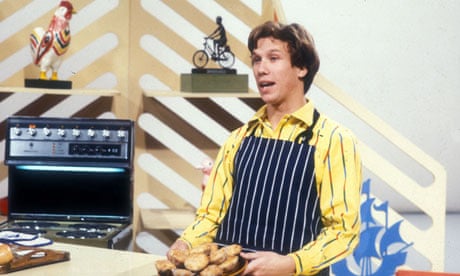Biddy Baxter, editor, 1965-1988
The careers officer at Durham University only had two suggestions for female graduates: teach or be a secretary. But I happened to notice a piece of paper in his office from the BBC that said: "Are you interested in people?" I thought that sounded marvellous – and that's where I ended up.
I started out in radio, then moved to Blue Peter. I wasn't terribly up on TV, though. I'm not even sure I owned one – although I must have. There was a very experienced production assistant called Edward Barnes who was told: "You'll have to look after Biddy – she doesn't know very much." He was furious. But he did it with good grace, and we gelled. It was Edward who came up with a brilliant idea, something that's common now, but was really new then. "We've got to have an identity," he said. "We've got to have a logo." So we asked this up-and-coming artist called Tony Hart to design an emblem and he came up with a galleon. Blue Peter is the name of the flag that's raised when a ship leaves harbour. And that was how we thought of the programme: as a ship that sets off on adventures.
On a budget of just £180 a show, we had to make Blue Peter appeal to kids from about four to 12. So we decided to award badges for a drawing, a painting, an interesting idea for the programme, or a good letter. So even if you were only three, you could still get a badge by doing a drawing. The postbag became a marvellous source of material: I should think about 75% of the show came directly or indirectly from viewer's letters, and we responded to every single one. of them, although sometimes we got terribly behind. As far as possible in a one-way medium, it was their programme.
One of the most incredible moments came when we got Anne Frank's dad on the show. We'd mentioned Anne and her diary, and got a letter from one of her relatives saying her father, Otto, was still alive. So we wrote to him, inviting him on – and he came. He was a very, very tall man, with not one ounce of malice in him. He said Anne's life had not been in vain because she had inspired children all over the world.
I wouldn't have stayed with the show so long if I hadn't enjoyed it so much. I became like a dinosaur. The thing is, you were never bored: there was just so much variety. If anyone felt a bit down, they'd go and read the letters. When the Blue Peter garden was vandalised, we got this huge correspondence. I remember a letter from one little boy who said he was very sorry to hear about the vandals and suggested that we needed to get a guard dog. You couldn't not respond to that.
Sarah Greene, presenter, 1980-83
Biddy told me they were looking for a female presenter after I'd been on to do an item about a show I was acting in. This was not part of my plan, which was acting and theatre all the way. I wanted to be running the National by the time I was 30! But Richard Briers, who was acting with my mother in the West End, said I absolutely must do it. "I'll do it for two years," I thought, "then go back to acting."
But once I started, I realised it would be the hardest part I'd ever play. It felt like I was standing there with no clothes on. That giant white studio felt endless: it seemed like anything could happen in there – and sometimes it did. As Biddy intended, you felt you were in a ship, setting sail with a crew you knew, but with no idea where you were going.
The programmes went out live, and there was no autocue or earpiece. We'd get the scripts the night before and have to learn them. Then we'd rehearse – and then Biddy would give us any number of notes before we went on. It would drive people nuts. It was all so nerve-racking, so exciting, that people were developing ulcers all over the place.
But there was a family atmosphere, too. Simon Groom and Peter Duncan [co-presenters] were like my brothers. I remember when Peter was cooking, I used to crawl around under the counter and bite his ankles. And another time, when Simon was just wrapping up a segment about hedge-laying before I had to do a really complicated item, he looked me straight in the eye and said: "As long as you have a good length, then you can manage a good lay." I could have killed him.

Comments (…)
Sign in or create your Guardian account to join the discussion